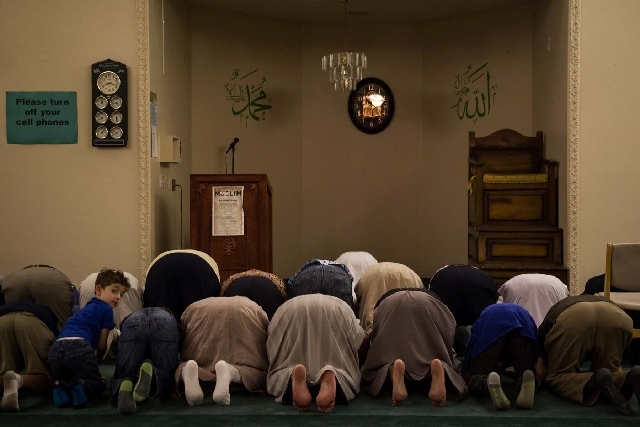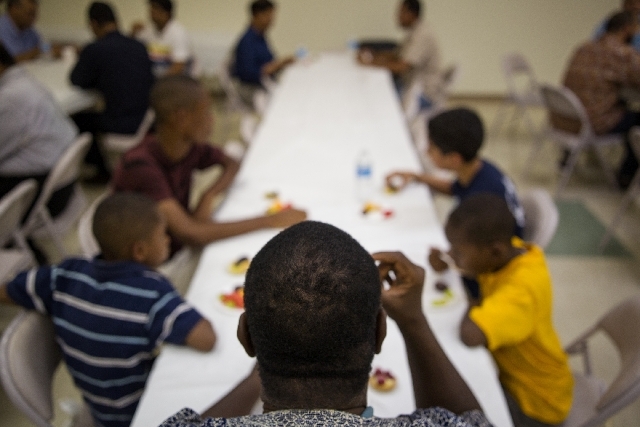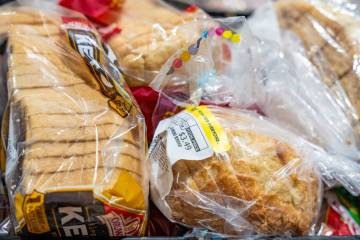Muslims seek to gain control of appetites, life during Ramadan
Ramadan, the monthlong Islamic religious observance that began last week, is multitextured and multilayered. Its focus is directed both inwardly, as believers strive to improve themselves and become closer to God, and outwardly, in helping others.
During Ramadan, Muslims pray and read the Quran. They try to gain control over their own desires, both physical and emotional. They practice charity and, at many mosques, share daily meals with Muslims and non-Muslims to give what they have and strengthen bonds among themselves.
So how come all anybody ever wants to talk about is the fasting?
Maybe it’s because Ramadan fasting — sunup to sundown, with no food, drink or water during daylight hours, and for an entire month — seems to be, when compared with other faith traditions’ fasting disciplines, so rigorous.
Or, maybe it has something to do with Ramadan fasting — which, as a function of the Islamic lunar calendar, moves around the seasons — seeming particularly challenging when (as it does this year) it falls in the arid thick of an already record temperature-tying Southern Nevada summer.
Muslims believe Ramadan is the month in which the Quran was revealed to the Prophet Muhammad. This year, it began at sundown Monday and ends on the holiday of Eid al-Fitr at sundown Aug. 7.
During Ramadan, Muslims pray, read the Quran, perform good works and fast from dawn to sunset from food, drink, water, sexual relations and sensual pleasures. Fasting during Ramadan is one of Islam’s “five pillars” and a core aspect of Islamic religious practice.
“I think one of the things that fascinates many people is that, of course (fasting) has spiritual and religious importance and that it is commanded by God,” said Dr. Aslam Abdullah, director of the Islamic Society of Nevada, 4730 E. Desert Inn Road.
But fasting at Ramadan isn’t merely about giving up things. Rather, Abdullah said, it’s a means of giving each believer “the opportunity to take control of his or her life ... and appetites.”
“Thirst and hunger is only a limited aspect of the fasting,” Abdullah said. More important, fasting is a means of “improving one’s own control over one’s behavior — one’s anger, one’s temper — controlling backbiting, controlling lying, all of those.”
Ramadan, in effect, “provides a month’s training to go back to their groups and see and evaluate their life and see whether they are moving in the right direction,” he said.
“Often, it is said that the purpose, as we understand it, as it has been described in the Scriptures, is so we could become conscious of our strengths and weaknesses so we could tell ourselves, ‘This is possible. We can change ourselves. It is possible we can take control of our life.’ ”
Beverly Senior-Keita converted to Islam about five years ago. She was Christian before that, and was introduced to Islam through her late husband, Issa Keita, whom she married in 1987.
Issa Keita, who was born into the faith, died in 2001. Beverly said her husband’s observance of Ramadan led her to think seriously about Islam.
“I remember that first year we fasted, and I would prepare the meals, and I was really intrigued by the whole ceremonial thing,” she said.
“We would get up early in the morning and have a pre-dawn meal. We would go to the mosque and do early morning prayer. Through the day there was no eating, and in the evening — which is wonderful — we would break the fast.”
Still, after she had converted to Islam, Senior-Keita admits that her first Ramadan fast was “very difficult for me because all I could think of was food.”
Even today, the first five to seven days of Ramadan fast are the toughest, she said. “Then your body gets used to it.”
Senior-Keita has found that rough patches can be gotten over by doing something else to keep her mind active, whether it’s spiritual reading or a project at work.
Also, she said, “the more I got into the religion, I started to understand and read about the past prophets and when they fasted. You notice that all of the people — Jewish, Christian, all people — they believed that fasting clears your mind to think on your creator.”
Typically, Muslim families will awaken before dawn during Ramadan for a shared meal. At the end of their daylong fast, after sunset, they’ll break their fast with a meal together.
“One important feature of this month is that at almost every mosque, not only in Nevada but around the world, the free breaking-the-fast (meal) is offered,” Abdullah said. “Anyone can join them. It’s not just Muslims, but non-Muslims.
“Every day, we expect approximately 200 to 250 people in the mosque. Then, on weekends, the number will increase. And that’s just one mosque. There are several mosques here in town.”
Abdullah also said that before the month of Ramadan ends, each worshipper will donate financial resources to provide at least one meal to others who are less fortunate than they are.
The sick and elderly are exempted from fasting, he said, although they are directed to take other actions — giving to charity, for example — and make up the fast if or when they are able.
Nor are children required to fast, although they are encouraged to do whatever they can. However, by age 12, children begin to fast for Ramadan, too.
Most, Abdullah said, are “very excited” about taking on the very adult obligation and joining the rest of the community in fasting.
Mohamad Dabbagh said that, before he began fasting for Ramadan around age 12, “my parents would go easy on me.”
Dabbagh, 22, said fasting “basically (is) to show, to prove to ourselves, that we can give up these things just for (God’s) sake.”
“For me, personally, when I was younger, I didn’t understand,” he said, which made the action of giving up food and drink all day difficult.
“But once it became more spiritual it became easier, because (fasting) is difficult. In fact, honestly, we try not to emphasize the fasting part too much. We try to emphasize what we are doing while we’re fasting.”
By the time Dabbagh entered high school, “I understood what was behind it and exactly why I was doing it,” he said. “That’s when it became really easy. Now, we actually look forward to it.”
Dabbagh is a biology major at the University of Nevada, Las Vegas who is planning a career in medicine. He said non-Muslim friends and classmates have been supportive of him over the years, even if they didn’t necessarily understand why he was fasting.
“Most of them don’t know you’re fasting,” he said. “Once they do find out you’re fasting, a lot of people actually had heard of Ramadan. That always surprised me.”
Because the dates of Ramadan are determined by the lunar-based Islamic calendar, the observance moves each year. Abdullah said the fact that fasting occurs in different seasons over time — seasons with shorter days and seasons with longer days, seasons with hotter weather and seasons with colder weather — does make keeping the Ramadan fast more challenging in some years than others.
“When I first came to Las Vegas, it was the month of December and that was when we were fasting,” he said. “And I think the idea in this is to take the believer out of monotony.”
Dabbagh said he does have to make an effort when fasting during the summer months to drink plenty of water during the hours that he can. He also must become conscious of not reflexively drinking at water fountains that he happens to pass.
The heat of a Southern Nevada summer does make fasting for Ramadan more challenging, he said. “But, again, we try to approach it from a spiritual point of view.”
Contact reporter John Przybys at
jprzybys@reviewjournal.com or 702-383-0280.



















